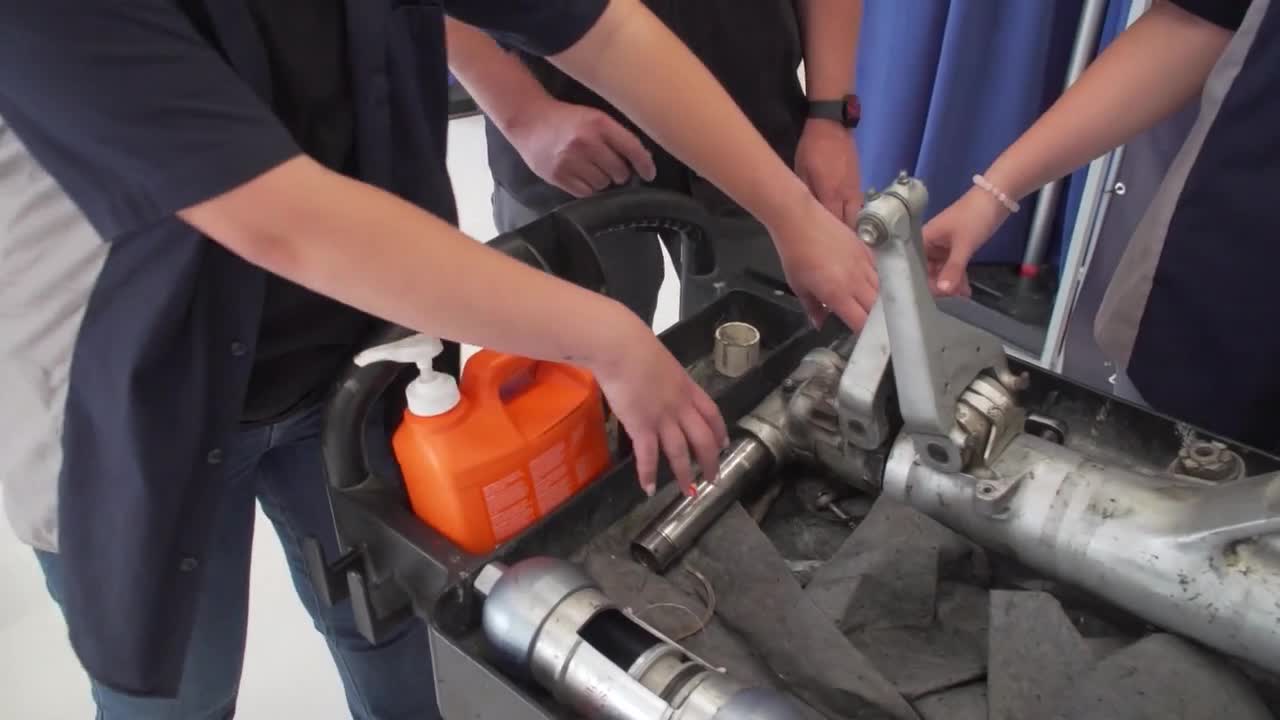BROOMFIELD, Colo. — Aircraft technicians provide a crucial job, but the industry is looking for ways to recruit and retain more new hires amid climbing air travel demand.
Over 60 years, thousands of aircraft mechanics have earned their wings at Spartan College’s campus in Broomfield. The aviation school, with its main campus in Tulsa, Oklahoma, has been training pilots and aircraft maintenance technicians for nearly a century.
“We work on the airframe, gear, landing gear, hydraulics, pneumatic systems, electronics, all the way to the turbine engine,” said Nicholas Brown, Spartan College’s Broomfield campus president and the chief academic officer for the school’s four other campuses.
Brown told Denver7 there are about 400 students on the Broomfield campus at any given time throughout the year, and Spartan’s aircraft maintenance technician program is 23 months long.

“We give students classroom instruction about 50% of the time, and the other 50% is going to be hands-on,” Brown explained. “Demonstrating the practical skill set to be eligible for their certification exams upon graduation.”
A Federal Aviation Administration-designated mechanics examiner validates that the training and exams meet professional standards.

Denver7 spoke with Lionel C. Taylor, a recently retired aircraft maintenance technician from California who worked for American Airlines for more than 30 years. Despite doing only occasional contractor work over the last few years, he said he seems to still be in demand for technician jobs.
“When I go through my email, I see that I'm being offered positions from companies all across America, and I haven't filled out a resume in a long time,” he said with a chuckle.
Boeing said the industry will need more than 700,000 new technicians to meet global demand over the next 20 years. A 2022 report from consulting firm Oliver Wyman looked into the issue, predicting a roughly 25% shortfall in North America by 2027.
Taylor said the industry was good to him, but over his three decades, he noticed younger workers often left for different jobs because of late hours or the blue-collar nature of the job.
“There was a time at certain points in my career where we needed more folks, and they weren't around, so we had to do more with less,” he said. “Overall, we had the manpower when needed.”
Taylor reiterated, however, that he never performed maintenance that would have compromised safety during his career.

Local
Flying above gender stereotypes: Women working in aircraft maintenance
Taylor recommends the industry for job-seekers, and said the industry could help fill the gap by doing more advertising and removing the stigma around the difficult parts of the job.
“It's a good position,” Taylor said. “You don't have to get dirty being an aircraft maintenance guy. I mean, you could work on the avionics department. You can work in the technical portion, dealing with log books, computers. You can even go into other fields, you know, unmanned aerial vehicles.”
Brown said increasing awareness for the next generation should be a priority.
“More often times than not, when I go to a classroom and talk to students at the K-12 level, they didn't even know that this was an option for them,” he said. “And so really opening their eyes to that.”
Brown also said changes have recently been made at Spartan College and other schools nationwide after working with the FAA.
“We went through an update to our training model in September of ’22,” he explained. “They updated the curriculum to be more focused towards where the industry demands are today… commercial aviation… business jets. Primarily beforehand, it was heavily focused on… general aviation. So there's some things that we brought into our curriculum to meet those changes and also help our students in better preparing them for the industry.”

The Oliver Wyman report proposes solutions to attract and retain Gen Z workers, including an increase in government subsidies and free tuition programs for AMT schools, introducing technologies like artificial intelligence, virtual reality and drones into curricula, and diversifying the workforce by hiring more women and minorities.
Despite the pressure on the industry and high-profile incidents involving airplanes, including the landing gear fire at Denver International Airport over the weekend, members of the aviation and technician industry say air travel is incredibly safe.
"Working in this field for as long as I have, I get on a plane every time and do not worry about what's going to happen," Brown told Denver7. "The safety record is just phenomenal... I'd rather fly in an aircraft and go to another city than get in a car and navigate I-70."




